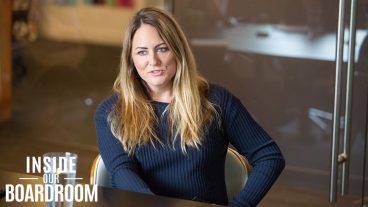We asked some of our top female entrepreneurs to share advice on what it takes to reach their level of success for a four-part blog series. With experiences ranging from the tech sector to recruitment firms to social enterprises, they each share lessons learned from their unique entrepreneurial journeys.
Today, we asked our leaders: What’s the best and worst advice you received when starting your entrepreneurial journey?
Best advice: Trust your gut. If something doesn’t feel right, you need to do something about it, and if something feels right, you need to do something about it.
Worst advice: Trust your gut. I do trust my gut, but I still need to think with my head, not with my emotions. A gut instinct will take you so far, the follow through, the work ethic, and the details is what will make it right.
With a no-holds-barred attitude, Zahra Al-Harazi helps people and organizations realize their potential for success, drawing on her experience as a pioneering woman in the business world with a unique approach to attitude, leadership, and success.
The worst advice I was given was to not take a risk and play it safe. After I graduated university, I was working at a mid-sized PR agency in Toronto. In the fall of 2008, I was presented with the opportunity to join a startup.
This was at the height of the recession, and when I asked friends and people in my network if I should take the job, many of them responded with a resounding “no.” They advised me to stay in the secure job and to keep climbing the corporate ladder. Luckily, I got the best advice from my mom, who said I should take the leap, “what’s the worst that could happen?” In that case, it was that the startup wouldn’t work out, and I would have to ask for my old job back or find a new one. But the potential upside — the startup growing and me learning a ton — was huge.
I always remember that advice when I’m making a decision: what’s the worst that could happen if I take this risk? I’ve learned that often the risk is more than worth taking.
Named one of Marketing Magazine’s “Top 30 Under 30”, Erin Bury is a marketer, former technology journalist, and startup enthusiast who shares the ins-and-outs of entrepreneurship, marketing to millennials, creating a killer personal brand, and how to harness the latest digital trends.
The best advice I was given was to never get comfortable. Even to this day, after growing two multi-million dollars companies, Creative Niche and RED Academy, I still put in the same amount of hustle I did from the first day I started.
If there’s one guarantee in business, it’s that nothing is guaranteed. You may be on top of the world today, then irrelevant the next. From innovation to flexibility to business development, never think you’re safe from turning the lights off.
Some of the worst advice I received wasn’t actually from a particular person, but rather a common myth that I’d like to debunk. Entrepreneurs are often told to “fake it till you make it,” but I couldn’t agree less. This idea implies that we have to pretend that we know it all, even when we don’t have a clue what to do (and trust me, this will happen many times along your journey!).
Because we don’t want to seem like a fraud or unworthy of a seat at the table, we pretend to have all of the answers. This serves no one, especially yourself. Admitting when you don’t know something is a strong character trait that is incredibly misunderstood. Managers often get caught in this trap, thinking that they have to have all of the answers so staff will respect them and people will buy-in.
In fact, it’s quite the opposite. Your employees, shareholders, and even customer base have a greater respect when a leader admits that they don’t know something. Then you work towards it together as a team, building greater bonds and transparency that will guide you down the right path.
Having successfully built two international businesses from the ground up, Mandy Gilbert speaks on entrepreneurship, leadership, culture, talent, and building a professional brand, all grounded by her own journey from a “one woman show” to founder of multi-million-dollar enterprises.
The best advice: “Feed the eagles, starve the turkeys.” There are only a few things that matter. Know what they are and place your energy into them. They aren’t always right in front of you so you need to look up and out more.
Starve the Turkeys — lots of things are right in front of you, pecking around, making noise, and demanding attention. It’s easy to pay attention to them most and first. Ignore them. They will actually do fine without you and your attention.
The worst advice is the one that sounds something like, “Just do it”, as in “hustle hard” or “grit” or “lean in.” These all suggest it’s on you and you alone to make things happen. That couldn’t be further from the truth.
You know when you’re watching a cop show like Law & Order, and Olivia Benson, the main cop, gets to the house where the bad guys are and she knows she should wait for backup, but she goes in anyway? That’s because she thinks she should “just do it.” But, Olivia’s wrong just like all the other advice that says it’s all on you. (And it’s enough to want to scream at the TV, “Weren’t you here last season? DON’T GO IN ALONE!”)
Seminal Harvard Business School research by Rosabeth Moss Kanter studied “onlys”— the only woman, or first woman of color, or the young person on a team — and found that three things constrain their ideas.
- They feel watched so they are super self-conscious as they try to perform.
- They are excluded from the social settings crucial for building relationships and trust.
- They feel pressure to assimilate to group norms.
Learn to build your tribe and you’ll get the outcomes you seek. None of us fail because we WANT to, or out of lack of grit. We conform because we NEED to, because Maslow’s Hierarchy of Needs says belonging is a more fundamental need than claiming one’s original idea.
Carol Bartz, who hired me at Autodesk and went on to run Yahoo, would mimic her male peers: golfing, swearing, wearing massive shoulder pads. It wasn’t lack of grit on her part, but because humans are social. We need congruence because ideas are not manifested into reality by oneself; they are not individual acts we control, but things we do together. For that, we need backup.
That’s why onlyness is NOT just a new way of saying “Be the best you! Kick ass! Go, girl!” Those are great things to say and do but they’re not where onlyness thrives. Onlyness is not just about standing OUT in a crowd, it’s about FINDING your crowd — the crowd that sees and hears you, that provides the scaffold and megaphone to help your ideas scale.
Nilofer Merchant is a master at turning seemingly “wild” ideas into new realities, and showing the rest of us how we can, too. A bestselling author on innovation and collaboration, a TED mainstage speaker, and the recipient of the “Future Thinker Award” from Thinkers 50, Nilofer reveals new ways of connecting our ideas to the world in an era when the potential to make a difference is wide-open.
Some people told me not to go on Dragons’ Den. I am sooooo glad I didn’t listen to them!
I met my mentor and investor, W. Brett Wilson, and was the first woman from Atlantic Canada to land a venture capital deal on the popular CBC show. I went on to win Top Game Changer and they gave me a new car. Imagine if I had ever listened to that bad advice? I would not be where I am today. I always go with my gut — your internal compass will help you stay on track.
The best advice I was given was to ensure everyone in the supply chain does well with you. The farmers, the suppliers, the stores — everyone has to succeed. When I hear people sharing that they pushed their supplier to a terrible and cheap place, I don’t think that is very good business. Business must be fair and lift everyone along the way.
In her inspiring talks, Barb Stegemann shares her journey from launching her award-winning social enterprise, The 7 Virtues, out of her garage to becoming the first Canadian brand featured in Sephora’s new “Clean at Sephora” space in both Canadian and US stores.
Best advice: “Act as if.” So often you feel like a fraud armed with a fancy PowerPoint and some big ideas. You can never say “if” this gets off the ground, it has to always be “when”. That is something I struggled with, which I think is a bit more common for young women.
Worst advice: You have to get on the train to raise Seed, Series A, Series B funding… that if you don’t raise from venture capitalists you are nothing.
Nicole Verkindt is passionate about leveraging the talents of entrepreneurs. Speaking to the importance of disruptive thinking, women’s roles in business, technology, and innovation, Nicole shows audiences how the real key to success is learning how to push past being told “no” over and over again.










